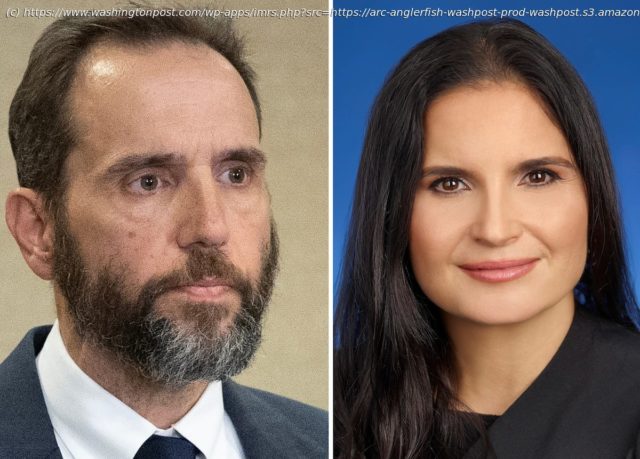Judge Aileen M. Cannon, a nominee of Donald Trump, tossed what many legal scholars considered the strongest criminal case against the former president.
U.S. District Judge Aileen M. Cannon, an appointee of President Donald Trump with relatively little experience on the bench, has been under intense scrutiny since she was selected to preside over Trump’s criminal trial for allegedly illegally retaining classified documents and obstructing government efforts to retrieve them.
She has been praised by Republicans, denounced by Democrats and second-guessed at almost every turn by legal experts. That clamor turned deafening Monday, when the federal judge in Florida tossed the high-profile case in a bombshell move hours before Trump officially became his party’s presidential nominee.
Ruling on a motion Trump’s attorneys submitted months ago, Cannon dismissed what many legal scholars considered the strongest criminal case against the former president and the one that was on the surest legal footing. Centered on highly sensitive national secrets and with significant evidence of alleged obstruction, it also appeared to be the one Trump most feared.
She ruled not on the merits of the case, but on the legality of the Justice Department’s appointment of a special counsel to oversee it.
Cannon’s 93-page opinion embraced a legal theory that special counsel Jack Smith was improperly appointed. It is one that has gained traction in conservative legal circles but remains “an outlier,” rejected by a handful of other judges who have considered it, said conservative legal scholar Jonathan Turley.
He called the ruling a “three-point shot” for Trump, who has repeatedly raised long-shot legal arguments in the case.
“This is a seismic ruling. The Florida case was the greatest threat to Trump,” Turley said. “The other cases have constitutional and statutory problems. The problems have increased over the last year, especially with the recent Supreme Court rulings in the Fisher and Trump cases.”
Turley was referring to recent decisions by the high court that prosecutors improperly used an obstruction charge to prosecute hundreds of Jan. 6 rioters and that Trump had broad presidential immunity from prosecution. The immunity decision narrowed key aspects of the indictment Trump faces in D.C. federal court for allegedly trying to overturn the 2020 election, with prosecutors having to prove which of his acts were official and which evidence they can use in the case. The obstruction ruling could also affect that indictment, because two of the four counts Smith brought against Trump involved obstruction.
Legal experts said Smith will almost certainly appeal Cannon’s classified-documents ruling to the 11th Circuit Court of Appeals, and the case could eventually make its way to the Supreme Court. Still, her dismissal of the indictment all but ensures that no trial will occur before November’s election or Biden leaves office.
Home
United States
USA — Science Dismissal draws new scrutiny to Judge Cannon’s handling of Trump case






